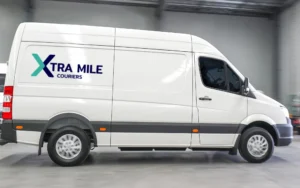How Courier Pricing Works in the UK: Complete Guide
Understanding how courier pricing works in the UK can save you a surprising amount of money and prevent frustrating, last-minute charges. Whether you’re shipping products every day as a small business or sending a single parcel to a friend, knowing how prices are calculated helps you stay in control. At Xtra Mile Couriers, we’re committed to complete transparency—no hidden fees, no confusing fine print, just clear and competitive rates tailored to the service you need.
This complete guide explains how UK courier pricing really works. We’ll walk you through the main cost factors, discuss real-world examples, and share practical tips you can use to keep your delivery costs low without sacrificing speed or reliability.
Key Factors That Determine Courier Pricing in the UK
Courier companies do not guess their prices. Instead, they use structured calculations that consider several variables. Understanding these helps you predict what your shipment will cost and make smart choices when planning deliveries.
1. Parcel Weight and Dimensions (Actual vs Volumetric Weight)
The first and most important factor is weight. However, it’s not always the number on the scale that matters. UK couriers often charge based on whichever is higher:
-
Actual weight, or
-
Volumetric (dimensional) weight, which reflects the amount of space your parcel uses in the van.
Volumetric weight is calculated using the formula:
(Length × Width × Height in cm) ÷ Divisor
Most UK domestic couriers use a divisor between 5000 and 6000.

Example:
Box size: 50 × 40 × 40 cm
Volumetric weight = (50×40×40) ÷ 5000 = 3.2 kg
If the parcel only weighs 1 kg, you will still be charged for 3.2 kg because of the space it occupies.
This system prevents oversized but lightweight items from taking up an unfair amount of room in the delivery vehicle. It’s especially important for e-commerce businesses that use larger packaging than necessary.
2. Delivery Speed and Service Type
Speed plays a huge role in the final price. The faster you need your parcel delivered, the more you pay due to prioritised routing and dedicated scheduling.
Here’s a general breakdown:
-
Economy/Standard (2–3 days)
The most affordable option, often 40–60% cheaper than express services. -
Next-Day Delivery
A popular choice for businesses needing reliable, fast shipping. -
Timed Services (by 9am, 10am, or 12pm)
Premium-priced because they require guaranteed routing. -
Same-Day Delivery
The most expensive, as it typically includes a dedicated driver and immediate dispatch.
At Xtra Mile Couriers, we keep same-day pricing competitive, starting from just £25 for local zones thanks to efficient routing and local availability.
3. Distance and Delivery Zones
Distance is another major cost component. Couriers divide the UK into zones, and each zone carries a different price bracket:
-
Local/Regional – Lowest cost
-
National Mainland – Standard pricing
-
Remote Areas – Higher charges due to difficult access, ferries, or long detours
-
International – Zone-based pricing, customs checks, and air freight fees
Remote areas, such as parts of Scotland, Isle of Man, or the Channel Islands, almost always come with additional charges. These surcharges help cover fuel usage, time, and limited transport infrastructure.
4. Fuel and Environmental Surcharges
Fuel has a direct impact on courier pricing. Many UK couriers apply a fuel surcharge, usually shown as a percentage of the base rate. Surcharges rise or fall depending on global fuel prices and the operational costs of running delivery fleets.
In addition, environmental fees such as Congestion Charges or ULEZ fees in cities like London may be applied when a courier enters restricted zones. These are typically passed on directly to the customer.
5. Additional Services and Add-Ons
Optional extras can increase the total price depending on the level of service you choose. These may include:
-
Signature on delivery – Often included at no extra cost
-
Enhanced insurance cover – Usually 50p–£2 per additional £100 of value
-
Doorstep collection vs drop-off – Collection commonly adds £2–£8
-
Special handling – Fragile, perishable, hazardous, or temperature-controlled items may incur £10–£50+
Although add-ons give more security and convenience, they can quickly increase costs. Understanding which extras you actually need helps you avoid unnecessary spending.
6. Parcel Type and Declared Value
High-value, delicate, or restricted items sometimes require additional fees. For instance:
-
Expensive electronics may need higher insurance
-
Liquids, aerosols, batteries, or chemicals may require special documentation
-
Items on restricted lists may affect price or eligibility for certain services
Always check a courier’s prohibited items list before shipping to avoid cancellations or extra charges.
Average Courier Prices in the UK
Below is a simplified snapshot of typical UK courier prices:
| Service Type | Small Parcel (<2kg) | Medium (2–10kg) | Large/Heavy (>10kg) | Same-Day Local |
|---|---|---|---|---|
| Economy (2–3 days) | £3–£8 | £6–£15 | £15–£40 | N/A |
| Next-Day | £5–£12 | £10–£25 | £25–£70 | N/A |
| Same-Day | £20–£50 | £40–£90 | £80–£200+ | £25–£80 |
Prices exclude VAT and optional surcharges.
At Xtra Mile Couriers, we consistently keep our prices below the national average while still offering premium-quality tracking, customer support, and delivery reliability.
Why Pricing Varies Between Courier Companies
The courier market in the UK is extremely competitive. Different providers have different strengths, cost structures, and service focuses.
Here’s a quick overview:
-
Royal Mail
Known for stable, banded pricing and VAT-exempt services. Good for small letters and parcels. -
Budget carriers (Evri, Yodel)
Usually cheaper for casual senders or high-volume parcels, but may have additional residential surcharges depending on the service. -
Premium couriers (DPD, UPS, DHL)
Higher base rates but include more features: reliable tracking, precise delivery windows, and robust customer service.
Xtra Mile Couriers aims to offer the perfect balance: fair pricing with premium features and a personalised service approach.

How to Save Money on UK Courier Shipments
The good news is that courier pricing isn’t fixed. There are many ways to take control of your costs. With the right strategies, you can save a significant amount over the course of a year.
1. Measure and Weigh Parcels Accurately
Guessing leads to being bumped into a higher weight bracket. Use a digital scale and measure boxes carefully. Even a few millimetres can make a noticeable difference in volumetric weight.
2. Choose a Slower Service When Timing Isn’t Critical
Next-day services are convenient but significantly more expensive. If your recipient doesn’t need rush delivery, economy services offer excellent value without compromising reliability.
3. Consolidate Multiple Parcels
Sending several items to the same address? Putting them into one larger parcel is often far cheaper than paying for multiple small ones.
4. Avoid Last-Minute Bookings
Urgent bookings typically cost more. Planning ahead allows you to select the most cost-effective option.
5. Use a Broker or Comparison Tool Initially
These tools help beginners compare several couriers at once. Over time, once you understand your needs, switch to a direct account for better rates.
6. Use Drop-Off Points Instead of Collections
Drop-off deliveries can save £3–£10 per parcel. Many networks, including those partnered with Xtra Mile Couriers, offer thousands of easy-access locations.
7. Negotiate Volume Discounts
If your business ships 50+ parcels per month, you can unlock 20–40% discounts with us. Building a long-term relationship with a courier always leads to better rates.
Transparent Pricing You Can Trust with Xtra Mile Couriers
Unlike many courier platforms that add hidden surcharges at checkout, Xtra Mile Couriers offers all-inclusive, upfront pricing. Our instant calculator considers:
-
Weight
-
Dimensions
-
Delivery speed
-
Zones
-
Any optional extras
This ensures you always know the exact cost before confirming your booking.
Whether you need same-day delivery across your city or affordable nationwide shipping, we go the extra mile to keep your costs fair and your deliveries fast, safe, and reliable.
5 FAQs About How Courier Pricing Works in the UK
1. What is volumetric weight and why does it increase my courier bill?
Volumetric weight reflects the amount of space your parcel takes up, not just its physical weight. It’s calculated by multiplying length × width × height (cm) and dividing the total by 5000–6000. Couriers charge whichever is higher—volumetric or actual weight—to ensure vehicle space is used fairly.
2. Why do some UK couriers add fuel surcharges?
Fuel surcharges help couriers absorb fluctuating fuel costs. They’re applied as a percentage based on current fuel market conditions and usually appear as a separate line on the invoice. Transparent companies like Xtra Mile Couriers list this clearly so you never face unexpected additions.
3. Is same-day courier delivery always expensive in the UK?
Same-day delivery usually costs more because it involves immediate dispatch and dedicated routing. Prices generally fall between £25 and £150, depending on parcel size and distance. That said, efficient providers like Xtra Mile Couriers keep local same-day rates affordable, starting as low as £25.
4. How do remote area surcharges work for UK deliveries?
Remote locations such as the Highlands, Scottish Isles, or parts of Northern Ireland require additional charges—typically £5–£25. These help cover long distances, ferry fees, or limited road access. Couriers list affected postcodes on their websites so customers can check before booking.
5. Can I reduce courier costs by choosing drop-off instead of collection?
Yes. Drop-off options at ParcelShops, lockers, or depots often save between £3 and £10 per parcel. Many networks used by Xtra Mile Couriers have wide coverage, making drop-off both cost-effective and convenient.
Xtra Mile Couriers: Delivering Excellence Every Time